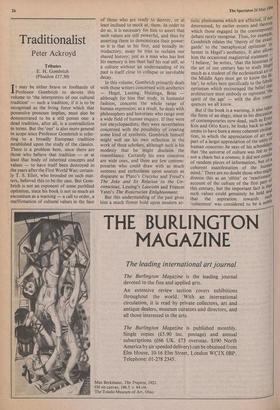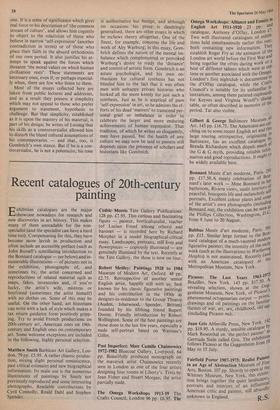Traditionalist
Peter Aar oyd
Tributes E. H. Gombrich (Phaidon £17.50)
It may be either brave or foolhardy of Professor Gombrich to devote this volume to 'the interpreters of our cultural tradition' — such a tradition, if it is to be recognised as the living force which that possessive pronoun implies, must also be demonstrated to be a still potent one: a dead tradition, after all, is a contradiction in terms. But the 'our' is also more general in scope since Professor Gombrich is refer- ring to a broadly European tradition established upon the study of the classics. There is a problem here, since there are those who believe that tradition — or at least that body of inherited concepts and values — to have itself been destroyed in the years after the First World. War; certain- ly T. S. Eliot, who brooded on such mat- ters, believed this to be the case. But Gom- brich is not an exponent of some purblind optimism, since his book is not so much an encomium as a warning — a call to order, a reaffirmation of cultural values in the face
of those who are ready to destroy, or at least inclined to mock at, them. In order to do so, it is necessary for him to assert that such values are still powerful, and thus by asserting them to demonstrate their power: so it is that in his first, and broadly in- troductory, essay he tries to reclaim our shared history; just as a man who has lost his memory is less than half his real self, so a culture without an understanding of its past is itself close to collapse or inevitable decay.
In this volume, Gombrich primarily deals with those writers concerned with aesthetics — Hegel, Lessing, Huizinga, Boas although for him that study, in humanist fashion, concerns the whole range of human expression; as a result, he deals with philosophers and historians who range over a wide field of human enquiry. If they were not encyclopaedists, they were nevertheless concerned with the possibility of creating some kind of synthesis. Gombrich himself might well see his own reflection in the work of these scholars, although such is his modesty that he might disclaim the resemblance. Certainly his own concerns are wide ones, and there are few contem- poraries who could draw with as much sureness and enthusiasm upon sources as disparate as Plato's Cratylus and Freud's The Joke and Its Relation to the Un- conscious, Lessing's LaocoOn and Frances Yates's The Rosicrucian Enlightenment.
But this understanding of the past gives him a much firmer hold upon modern ar-
The Spectator 26 May 1984 tistic phenomena which are affected, if not determined, by earlier events and theories which those engaged in the contemporary debate rarely recognise. Thus, for examPle, Gombrich relates the 'theory of the avant- garde' to the 'metaphysical optimism' in- herent in Hegel's aesthetics. It also allows him the occasional magisterial statement 'I believe,' he writes, 'that the historian of the art of our century has to study Hegel , much as a student of the ecclesiastical art 01 the Middle Ages must get to know the Bt' ble'; he refers here specifically to the febrile . optimism which encouraged the belief that architecture must embody or represent 'the spirit of the age' — with the dire cone' quences we all know. But if the book is a warning, it also takes the form of an elegy, since in his discussion of contemporaries now dead, such as Ernst Kris and Otto Kurz, he looks back to 'NW' seems to have been a more coherent civilisa" tion, in which the appreciation of art was part of a larger appreciation of the unity of human concerns; he says of his schooldays that 'the universe of culture was felt to r, not a chaos but a cosmos; it did not consl,s' of random pieces of information, but 01 3 coherent manifestation of the human t mind.' There are no doubt those who dismiss this as an 'elitist' or 'reactionau; account of the culture of the first part this century, but the important fact is &la' such values could genuinely be held 811, that the aspiration towards such 'coherence' was considered to be a
one, It is a sense of significance which gives real force to his description of 'the common stream of culture', and allows him cogently to object to the relativism of those who believe in narrow 'self-expression' (another contradiction in terms) or of those who place their faith in the absurd orthodoxies of our own period. It also justifies his at- tempt to speak against the forces which threaten 'the moral values on which human civilisation rests'. These statements are necessary ones, even if, or perhaps especial- ly when, there are few who listen to them.
Most of the essays collected here are taken from public lectures and addresses, and as a result they possess a simplicity which may not appeal to those who prefer argument to statement, hypothesis to challenge. But that simplicity, established as it is upon the mastery of his material, is part of his design; he writes of Lessing that his skills as a controversialist allowed him to disturb the bland cultural assumptions of his contemporaries — and that, too, is Gombrich's own stance. But if he is a con- troversialist, he is not a polemicist; his tone is authoritative but benign, and although on occasions his prose is dauntingly generalised, there are other essays in which he eschews theory altogether. One of the finest, for example, concerns the life and work of Aby Warburg; in this essay, Gom- brich defines the nature of the mental im- balance which complemented or provoked Warburg's desire to study the 'distance' and control of artistic form. Gombrich is an astute psychologist, and his own en- thusiasm for cultural synthesis has not blinded him to the fact that it was often men with unhappy private histories who looked all the more keenly for just such a synthesis. Just as he is sceptical of pure 'self-expression' in art, so he admires the ef- forts of his dead 'masters' to transcend per- sonal grief or imbalance in order to celebrate the larger and more enduring achievements of human expression. That tradition, of which he writes so eloquently, may have passed, but the health of any culture we may now be said to possess still depends upon the presence of scholars and historians like Gombrich.















































 Previous page
Previous page